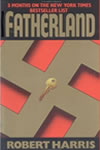Fatherland
by Robert Harris
It is 1964. Europe is united, and from London to Moscow, from Oslo to Rome, you can use the same currency — the Reichsmark. The world is not entirely peaceful — terrorist bombings disturb even the great European capital of Berlin, inspired by the remains of the Soviet resistance in Siberia. The U.S. and Germany have been fighting a cold war for twenty years, but President Kennedy has just announced a call for détente that has been warmly greeted by the 75-year-old Führer. Nobody knows what happened to the Jews, but they're assumed to have been resettled somewhere on the Russian frontier. Nobody asks.
And then, one night, a police dispatcher gets the duty roster mixed up and, when the body of a rich old bureaucrat washes up in the Havel, the wrong inspector is summoned to the scene and the world begins to unravel.
This skillfully-wrought book is great fun, but it is also instructive on two counts. It came to my attention because Nick Horny mentioned it in his column in The Believer; Harris is Hornby's brother-in-law but Hornby mentioned that Harris has a knack for conveying historical information without stopping for buckets of exposition. After all, people in 1964 Berlin don't stop to talk about what happened on the Eastern Front in 1943: everybody knows about the war. Finding ways to explain to the reader what everyone knows is the special challenge of the historical novel, and Harris does a wonderful job here, varying his technique and approach so you never know when new vistas are about to open.
Second, this is a very neat formal experiment. The mystery, after all, is not a puzzle: the point of the mystery is that the world has been damaged — a crime has been committed — and the hero works to restore the damaged world to health. And here, of course, the world has been damaged: even in Nazi Berlin, it's not nice to find bureaucrats knocked on the head and thrown in the river. But restoring the world to the status quo can’t be the goal, either; you can't go home again, and when the police inspector learns about the provenance of the socks he used to wear in his U-boat, he doesn't want to go home.
